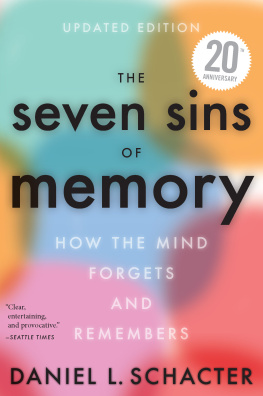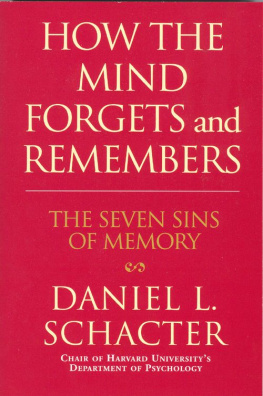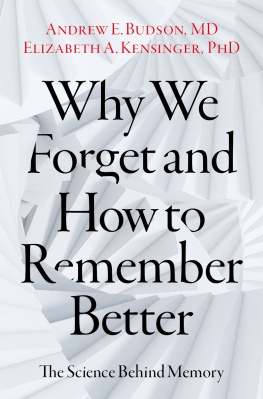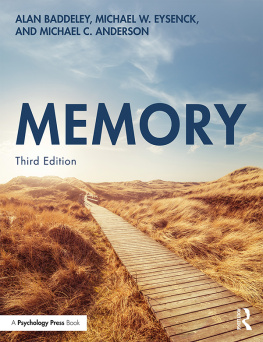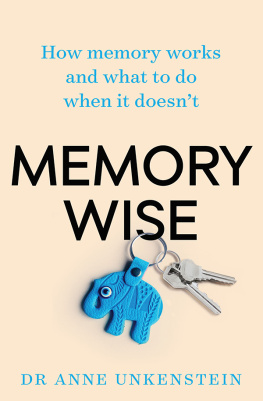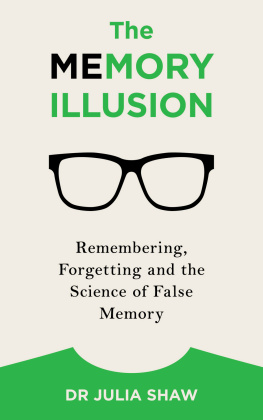Second Mariner Books Edition 2021
Copyright 2001, 2021 by Daniel L. Schacter
All rights reserved
For information about permission to reproduce selections from this book, write to or to Permissions, Houghton Mifflin Harcourt Publishing Company, 3 Park Avenue, 19th Floor, New York, New York 10016.
hmhbooks.com
Library of Congress Cataloging-in-Publication Data
Names: Schacter, Daniel L., author.
Title: The seven sins of memory : how the mind forgets and remembers / Daniel L. Schacter.
Description: Updated edition. | Boston : Mariner Books ; Houghton Mifflin Harcourt, 2021. | Includes bibliographical references and index.
Identifiers: LCCN 2021014679 (print) | LCCN 2021014680 (ebook) | ISBN 9780358325680 (trade paperback) | ISBN 9780358296997 | ISBN 9780358297055 | ISBN 9780618219193 | ISBN 9780547347455 (ebook)
Subjects: LCSH: Memory disorders. | Memory. | Recollection (Psychology)
Classification: LCC BF376 .S33 2021 (print) | LCC BF376 (ebook) | DDC 153.1/2dc23
LC record available at https://lccn.loc.gov/2021014679
LC ebook record available at https://lccn.loc.gov/2021014680
Cover design by Mark Robinson
v1.0821
Figures 1.1 and 1.2: Psychology, Fifth Edition by Daniel L. Schacter, Daniel T. Gilbert, Matthew K. Nock, and Daniel M. Wegner. Copyright 2020 by Worth Publishers. All rights reserved. Used by permission of the publisher Macmillan Learning.
Figure 4.1: Reproduced from Figure 1 () in Mark Tippens Reinitz, Joseph Morrissey, and Jonathan Demb, Role of attention in face encoding, Journal of Experimental Psychology: Learning, Memory, and Cognition, 1994, 20, 161168. Copyright 1994 by The American Psychological Association. Used by permission of Mark T. Reinitz, Ph.D.
For my family:
S USAN, H ANNAH, AND E MILY
Acknowledgments
It sometimes seems unfair that a book bears only an authors name, because a number of people are responsible, directly or indirectly, for its conception, development, and production. This book is no exception. Ive had the good fortune to consult with many colleagues and students about the topics in these pagestoo many to thank individually. I hope that you know who you are and realize that I greatly value your input. I am especially thankful to the members of my laboratory during the past few years; your feedback and ideas have been invaluable for this book and all of my other scientific endeavors.
I owe a special debt to those who have taken the time to read and comment on the manuscript. Moshe Bar, Chad Dodson, Marc Hauser, Lael Schooler, David Sherry, and Gabriella Vigliocco provided incisive feedback on specific chapters, which helped me to rethink some important issues and saved me from a variety of oversights and errors. Randy Buckner, Wilma Koutstaal, Richard McNally, and Anthony Wagner read the entire manuscript, coming up with many helpful suggestions and constructive criticisms that have improved the final product considerably. Several of my research assistantsSteve Prince, Carrie Racine, and Danielle Ungerhave helped me in ways too numerous to list; I want them to know how much I value their time and effort.
Laura van Dam, my editor at Houghton Mifflin, supported the book enthusiastically and provided insightful comments on several drafts of the evolving manuscript. Her keen eye for both style and substance helped me to improve the final product immensely. My agent, Susan Rabiner, lent her wisdom and energy to this project, and I appreciate both.
I began The Seven Sins of Memory during a sabbatical year that was supported by a John Simon Guggenheim Memorial Fellowship and an award from the James McKeen Cattell Fund; without them, I could not have completed it. I spent several months of my sabbatical at the Institute for Cognitive Neuroscience at University College London, where I wrote parts of the book. I am indebted to Professor Tim Shallice for making my stay possible, and to colleagues and staff at the institute for making my visit both enjoyable and productive. I am also thankful to the funding agencies that have supported my ongoing research: Human Frontiers Science Program, National Institute on Aging, National Institute of Mental Health, and National Institute on Neurological Disorders and Stroke. I describe significant portions of the work they have supported in these pages.
Finally, I owe so much to my wife, Susan McGlynn, and my daughters, Hannah and Emily Schacter, that I hardly know how to begin to say thanks. As a start, I dedicate this book to them.
Preface to the
Updated Edition
I AM AMAZED THAT two decades have passed since I wrote the first edition of The Seven Sins of Memory, but the calendar doesnt lie. More than once during that time, Ive come across an exciting new research finding or intriguing idea that is relevant to one of the sins and immediately thought: I wish I had been able to talk about that in the book! So, when my agent, Susan Rabiner, let me know that Houghton Mifflin Harcourt would be interested in publishing an updated version of Seven Sins, I embraced the opportunity to incorporate some of the important new developments regarding the sins that have emerged since 2001. Ive done so by building on the contents of the 2001 edition with updates at the end of each chapter that discuss two noteworthy developments that are relevant to that chapter. Much has happened in memory research since 2001, and because I couldnt do justice to all of it without writing an entirely new book, I have included updates about ideas and findings that I think either illuminate the nature of the memory sins or highlight their impact on our day-to-day lives in a compelling way. I very much hope that the updates are as interesting for you to read as they have been for me to write.
The updates have been improved by feedback from students and colleagues who have taken the time to read them: thanks to Nadia Brashier, Adam Bulley, Alexis Carpenter, Ethan Harris, Catherine Ho, Sarah Kalinowski, Kevin Madore, Johannes Mahr, Paul Seli, Preston Thakral, Ruben van Genugten, John Wixted, and Jordana Wynn for their valuable input and insights. Im also greatly appreciative for many stimulating discussions with students in my freshman seminar at Harvard concerning the seven sins of memory, which Ive offered every few years since 2001 and will hopefully benefit from an updated course text. I also thank Susan Rabiner for planting the idea of a new edition and my editor at Houghton Mifflin Harcourt, Nicole Angeloro, for her interest and support throughout the revision process.
Finally, I dedicated the 2001 edition of this book to my wife, Susan, and my (now very impressive adult) daughters, Hannah and Emily, and with great satisfaction I do so again twenty years later.
D ANIEL S CHACTER
April 2021
Introduction
A Blessing Bestowed
by the Gods
I N YASUNARI KAWABATAS UNSETTLING short story Yumiura, a novelist receives an unexpected visit from a woman who says she knew him thirty years earlier. They met when he visited the town of Yumiura during a harbor festival, the woman explains. But the novelist cannot remember her. Plagued recently by other troublesome memory lapses, he sees this latest incident as a further sign of mental decline. His discomfort turns to alarm when the woman offers more revelations about what happened one day when he visited her room. You asked me to marry you, she recalls wistfully. The novelist reels while contemplating the magnitude of what he has forgotten. The woman explains that she has never forgotten their time together and feels continually burdened by her memories of him.
After she leaves, the shaken novelist searches maps for the town of Yumiura with the hope of triggering recall of the place and the reasons why he had gone there. But no maps or books list such a town. The novelist then realizes that he could not have been in the part of the country the woman described at the time she remembered. Though the woman believed that her detailed and heartfelt memories were accurate, they were entirely false.

